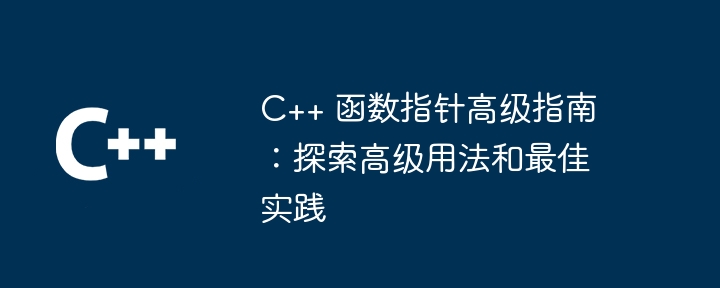Home >Backend Development >C++ >Advanced Guide to C++ Function Pointers: Explore advanced usage and best practices
Advanced Guide to C++ Function Pointers: Explore advanced usage and best practices
- WBOYWBOYWBOYWBOYWBOYWBOYWBOYWBOYWBOYWBOYWBOYWBOYWBOriginal
- 2024-04-29 15:54:02745browse
C Advanced usage of function pointers: Function pointer array: Store multiple function pointers in an array to facilitate calling different types of functions. Function pointers as function parameters: Use function pointers as parameters of other functions to achieve code dynamics and reusability. Standard library function pointers: Use standard library functions such as std::function and std::bind to handle function pointers.

Advanced Guide to C Function Pointers: Advanced Usage and Best Practices
Preface
Function pointers are a powerful tool in C that allow you to work with your code in a more flexible way. This guide will dive into advanced usage and best practices of function pointers to help you leverage their full potential.
Advanced Usage
Function Pointer Array
Function Pointer Array allows you to store multiple function pointers in an array . This is useful when you need to call multiple functions with different types:
using FnType = void (*)(int); // 定义函数指针类型
FnType functions[] = {&func1, &func2, &func3};
for (FnType fn : functions) {
fn(value); // 调用函数
}Function pointer as function parameter
You can use function pointer as function parameter, thus The power of function pointers is passed to other functions. This enables code dynamism and reusability:
void callFunction(FnType fn) {
fn(value);
}Standard library function pointer
C The standard library provides many functions that use function pointers, such asstd::function and std::bind:
-
std::functionis a general function pointer that can be used for storage and call any type of function. -
std::bindAllows you to create a new function pointer that calls an existing function with specific parameters.
Practical case
Sort function pointer
Let’s look at a comparison and sorting of integers using function pointers Practical case:
#include <algorithm>
#include <vector>
bool compare(const int& a, const int& b) {
return a < b;
}
int main() {
std::vector<int> v = {3, 1, 4, 2};
// 使用 compare 函数指针对向量排序
std::sort(v.begin(), v.end(), compare);
for (const int& el : v) {
std::cout << el << " ";
}
return 0;
}Output result:
1 2 3 4
Summary
Function pointers provide powerful flexibility in C, by making full use of advanced With usage and best practices, you can make your code more reusable, scalable, and dynamic. With arrays of function pointers, function parameters, and standard library functions, you can unlock novel and efficient programming solutions.
The above is the detailed content of Advanced Guide to C++ Function Pointers: Explore advanced usage and best practices. For more information, please follow other related articles on the PHP Chinese website!
Related articles
See more- A summary of the python standard library Beautiful Soup and MongoDb climbing Himalayan Radio
- Solve the problem that vscode cannot find the c++ header file under windows
- How to read and write files in c++
- Examples of logging usage in the Python standard library
- How are C++ function pointers used for callback functions and event handling?

